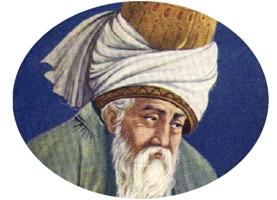|

Rumi – a Brief Biography
The name
Mowlana Jalaluddin Rumi stands for love and ecstatic flight into the infinite. Rumi is one of the great
spiritual masters and poetical geniuses of mankind and was the founder of the Mawlawi Sufi order, a leading
mystical brotherhood of Islam. During his lifetime he produced a prolific range of timeless inspiring and
devotional poetry which encapsulates the Sufi experience of union with the Divine. Although Rumi
was a Muslim and a great scholar of the Qu’ran, his appeal reaches across religious and social divisions.
Even during his lifetime he was noted for his cosmopolitan outlook. His funeral in 1273, which lasted 40
days, was attended by Muslims, Jews, Persians, Christians and
Greeks.
Rumi was born in 1207 in Wakhsh,Tajikistan, to a family of theologians. It was a period of
great social and political turbulence, including the era of the crusades. Escaping the Mongol invasion and
destruction, Rumi and his family travelled extensively in the Muslim lands and finally settled in Konya,
Anatolia, then part of the Seljuk Empire. When his father, Bahaduddin Valad, passed away in 1231, Rumi, at
the age of 24 already an accomplished scholar, succeeded him as a professor in religious sciences.
Rumi met many of the great Sufi poets, including the Sufi Master, Attar. Attar is said to
have commented about Rumi, then still a young boy: "There goes a river dragging an ocean behind it." The most
important turning point in Rumi’s life was when he met the wandering dervish Shamsuddin of Tabriz. Shams was
eccentric and unorthodox, but filled with heartfelt devotion, that sometimes he couldn’t contain. He seemed to be
quite different to the respectable and prestigious scholar. However Rumi saw in Shams a divine presence. This
meeting and their close mystical relationship was instrumental in awakening Rumi’s latent
spirituality and intense devotion. His love and then his bereavement at the
death of Shams found their expression in a surge of music, dance and lyric poems, ‘Divani Shamsi Tabrizi’
(Divan). Rumi is also the author of a six-volume poetic work, set up in a teaching-style format,
the‘Mathnawi
’, sometimes called the ‘Koran in
Persian’.
Rumi’s poetry is wide ranging and encompasses many different ideas, but behind all of it the
essential theme is the absolute love of God and the longing and searching for the union with the Divine. Being a
great mystic, his poetry was a reflection of his own inner consciousness. Ironically Rumi said that no words could
adequately explain the experience of the mystical union. Yet his words are inspiring signposts which point towards
the Divine. His influence on thought, literature and all forms of aesthetic expression in the world of
Islam cannot be overrated. Rumi's poetry is so
widely appreciated because it has the capacity to uplift our own consciousness. Reading the words of Rumi can
awaken in ourselves our own spiritual self.
Reference:
Richard Pettinger (http://www.writespirits.com) and http://www.rumi.org.uk/life.html
For another, but similar perspective on divine grace, click
here.
| 

 Facebook
Facebook Twitter
Twitter Digg
Digg Stumbleupon
Stumbleupon